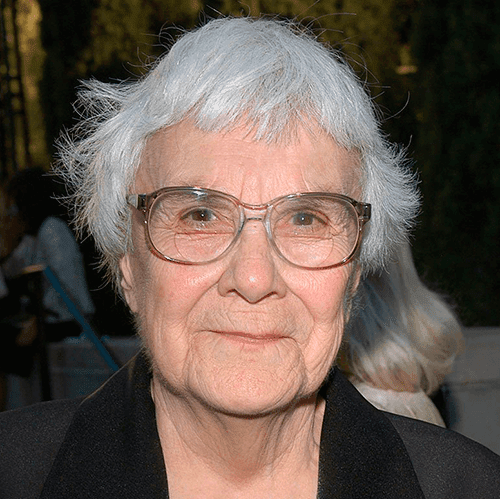Harper Lee's Life

Harper Lee, born on April 28, 1926, was an American author best known for her Pulitzer Prize-winning novel, "To Kill a Mockingbird." Lee was born in Monroeville, Alabama, and grew up in a small town where her father was a lawyer and served as the inspiration for the character of Atticus Finch in her novel.
Early Life and Education
Harper Lee was the youngest of four children born to Amasa Coleman Lee and Frances Cunningham Finch Lee. Her mother's maiden name was the inspiration for the name of the main character in "To Kill a Mockingbird." Lee attended Huntingdon College in Montgomery, Alabama, for a year before transferring to the University of Alabama to study law. However, she dropped out after her first year to pursue a career in writing.
Career
After leaving the University of Alabama, Lee moved to New York City to pursue a writing career. She worked as a ticket agent for Eastern Airlines and wrote in her spare time. In 1957, she submitted a manuscript for a novel to an agent at J. B. Lippincott & Co. That manuscript would eventually become "To Kill a Mockingbird."
"To Kill a Mockingbird"
"To Kill a Mockingbird" was published in 1960 and was an immediate critical and commercial success. The novel, set in the fictional town of Maycomb, Alabama, in the 1930s, tells the story of a young girl named Scout Finch and her brother Jem as they learn about racial injustice and prejudice in their town. The novel's protagonist is Scout's father, Atticus Finch, a lawyer who defends a black man falsely accused of raping a white woman.
"To Kill a Mockingbird" was an instant success, selling more than 10 million copies in its first year of publication. It won the Pulitzer Prize in 1961 and was adapted into an Academy Award-winning film in 1962. The novel has since become a classic of American literature and is widely taught in schools.
"To Kill a Mockingbird" was Lee's first and most famous novel. The book is set in the fictional town of Maycomb, Alabama, during the 1930s, and it tells the story of a young girl named Scout Finch and her brother Jem as they navigate the racial tensions and prejudices of their small town. The novel's protagonist is Scout's father, Atticus Finch, a lawyer who defends a black man falsely accused of raping a white woman. "To Kill a Mockingbird" won the Pulitzer Prize in 1961 and has since become a classic of American literature.
"Go Set a Watchman"
"Go Set a Watchman" is Lee's second novel, published in 2015, more than 50 years after "To Kill a Mockingbird." The book was actually written before "To Kill a Mockingbird," but Lee's editor at the time suggested that she write a different story from the perspective of a young Scout Finch. "Go Set a Watchman" features an adult Scout returning to Maycomb to visit her father, Atticus, and grappling with her own beliefs and values in the face of the changing times. The novel received mixed reviews upon its publication, but it provides an interesting look at Lee's original intentions for the characters and themes of "To Kill a Mockingbird."
Other Works
In addition to her two novels, Lee also wrote a few other works that were never published. One of these was a true crime book about a series of murders in Alexander City, Alabama, which Lee was researching in the late 1970s. Another was a series of humorous articles she wrote for McCall's magazine in the 1960s.
Lee was also a close friend of Truman Capote, and she assisted him in his research for his own true crime book, "In Cold Blood." Lee is said to have helped Capote interview witnesses and gather information about the murders of a Kansas family in 1959. The two writers had a complicated friendship, and their relationship is the subject of much speculation and analysis.
Although Harper Lee only published two novels in her lifetime, her impact on American literature and culture is significant. "To Kill a Mockingbird" remains a powerful and important novel, and Lee's portrayal of Atticus Finch as a moral compass and champion of justice has had a lasting impact on American culture. Lee's legacy is also tied to her quiet and private nature, as she largely avoided the public eye after the success of "To Kill a Mockingbird." Lee died in 2016 at the age of 89, but her works continue to inspire readers and writers alike.
Later Life
After the success of "To Kill a Mockingbird," Lee largely withdrew from public life. She gave few interviews and did not publish any other novels for more than 50 years. In 2015, a second novel by Lee, "Go Set a Watchman," was published. The novel, which had been written before "To Kill a Mockingbird," features an adult Scout Finch returning to Maycomb to visit her father.
Lee died on February 19, 2016, at the age of 89.
Legacy
Harper Lee's legacy is largely defined by "To Kill a Mockingbird," which is considered one of the most important novels of the 20th century. The novel's themes of racial injustice, prejudice, and the loss of innocence continue to resonate with readers today.
Lee's portrayal of Atticus Finch as a moral compass and champion of justice has also had a significant impact on American culture. Atticus Finch is widely regarded as a hero and a role model, and the character has been cited by lawyers and judges as an inspiration for their own work.
Despite Lee's relatively small body of work, her impact on American literature and culture is significant. "To Kill a Mockingbird" remains a powerful and important novel, and Lee's legacy as an author will continue to be celebrated for generations to come.